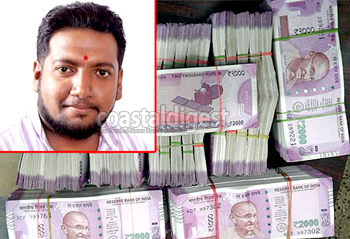Bengaluru, Jun 20: Nine candidates filed their nominations for the June 29 elections to seven seats of the Karnataka legislative council on Thursday.
While the BJP has fielded four candidates, the Congress has given tickets to two and the JD(S) to one candidate respectively for the biennial elections to seven seats of the legislative council to be elected by the MLAs.
One independent and one person claiming to be affiliated to BJP have also filed their nomination papers at the office of Legislative Assembly Secretary MK Vishalakshi, who is also the returning officer for the polls.
"The nominations of two candidates without any proposers is likely to be rejected during scrutiny of the papers on Friday. So seven candidates will be in the fray for as many berths. Hence the election is likely to be unopposed if no one withdraws nominations," official sources said.
While scrutiny will take place, Friday, June 22 is the last date for withdrawal of candidature.
The election is necessitated as the term of seven MLCs — Naseer Ahmed, Jayamma, M C Venugopal, N S Bose Raju, H M Revanna (all Congress), T A Sharavana (JD(S)) and independent D U Mallikarjuna — will end June 30.
Based on their strength in the Assembly, while BJP is in a position to win four out of seven seats, Congress can win two and JD(S) one.
Twenty-eight valid votes of MLAs are required for each candidate to win.
Four BJP candidates MTB Nagaraj, R Shankar, Sunil Vallyapure and Pratap Simha Nayak filed their nominations today, after the party high command announced their names late on Wednesday.
Nagaraj and Shankar had played a key role in the formation of the BJP government after the coup that led to the collapse of Congress-JD(S) coalition.They had subsequently defected to the saffron party.
While Nagaraj lost the bye-elections held later, Shankar did not contest in exchange for a Council berth promise.
Among the other BJP candidates, Vallyapure is a former MLA from Chincholi and had given up his seat abiding by the party decision to field Avinash Jadhav, while Nayak is a senior party worker and had served as Dakshina Kannada district president.
A BJP insider said Shankar and Vallyapure have been given MLC tickets as they had given up their Assembly seats, while Nagraj was considered as he had faced a defeat during the bypolls because party MP B N Bachhe Gowda's son Sharath contested as a rebel.
Nayak's candidature is being seen as BJP high command's choice by party insiders, ignoring the state units recommendation of AH Vishwanath, a former JD(S) MLA who had defected to BJP.
Two Congress candidates, senior party leader BK Hariprasad and incumbent Naseer Ahmed also filed their nominations today.
Hariprasad's name was announced by the party on Wednesday, even as his tenure in Rajya Sabha is to end on June 25.
Naseer Ahmed, who is retiring as MLC on June 30 is seeking another term.
The choice of candidates by the Congress high command is being seen as a mixed bag for CLP leader Siddaramaiah as Naseer Ahmed is said to be close to him, while Hariprasad is considered among his adversaries.
In a surprise move, JD(S) has fielded Govinda Raju from Kolar as the party candidate for the MLC polls.
Incumbent MLC T A Sharavana and outgoing Rajya Sabha member Kupendra Reddy were seen as the prime aspirants for the ticket.
JD(S) leader and former Chief Minister H D Kumaraswamy said Govinda Raju was chosen as it would help organise and strengthen the party in Kolar and Chikkaballapura region.
The independent candidate who has filed his papers today is P C Krishnegowda, and the one who filed his nomination claiming to be associated with BJP is Mandikkal Nagaraja.





Comments
"Make in India" program.
Now all people know fake currency is from ,,,,,,,,,,
Police soon will catch several others
Modi's "Make or Made in India" - It may be thousands in the places of Goondaism Govt. states like Maharastra, UP... etc...
Add new comment